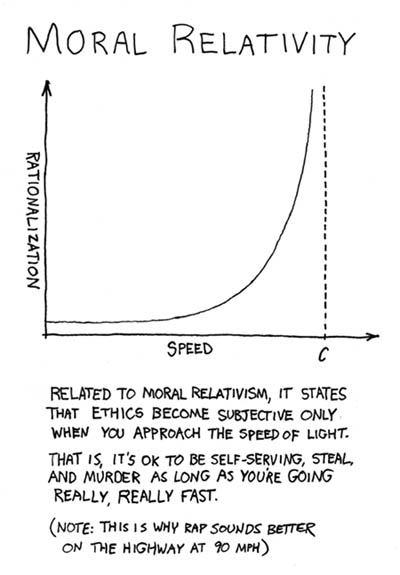103: Moral Relativity
| Moral Relativity |
 Title text: It's science! |
Explanation
The main joke in this comic is its interpretation of moral relativity along the same lines as the Theory of Relativity. In the field of Ethics moral relativity holds that moral judgements are not absolute, but rather relative to the group of people involved. The Theory of Relativity predicts (among other things) that measurements of an object change the closer to the speed of light it travels—length contracts, observed time slows down, the notion of separated simultaneous events is relative, etc. Thus it's humorous that the ethics of a situation would be relative the same way physical properties change as the speed of light is approached.
Note that relativity in Theory of Relativity (in physics) came from principle of relativity idea that equations describing the laws of physics have the same form in all admissible frames of reference (as opposed to moral relativity).
Transcript
- [A graph, rationalization as a function of speed, increasing exponentially with an asymptote at c.]
- Related to moral relativism, it states that ethics become subjective only when you approach the speed of light.
- That is, it's okay to be self-serving, steal, and murder as long as you're going really, really fast.
- (Note: This is why rap sounds better on the highway at 90 mph)
Discussion
The issue date might be off. All files since #101 have been created on April 11th, 2006. Anyone with an actual issue date? -- Rikthoff (talk) 13:09, 3 August 2012 (UTC) (please sign your comments with ~~~~)
Guys, there is actually such a thing as Moral relativism, which is "the positive or descriptive position that there exist, in fact, fundamental disagreements about the right course of action even when the same facts hold true and the same consequences seem likely to arise". e.g. oh... maybe whether a government should pay a ransom to some group for a kidnapped citizen? There's probably a far better example.
But, anyway, this also maps well to the whole "two observers moving in differing frames of reference cannot agree on various facts" form of the Space-Time relativism. (As referenced in 265 and 514, amongst others.) 178.98.31.27 21:56, 23 June 2013 (UTC)
I think that https://en.wikipedia.org/wiki/Trolley_problem is also related to Moral Relativity, and it happens to involve moving trolley. So you kinda can see it the way that the speed of the trolley affects moral choices. 172.68.246.146 (talk) 17:46, 14 September 2019 (UTC) (please sign your comments with ~~~~)